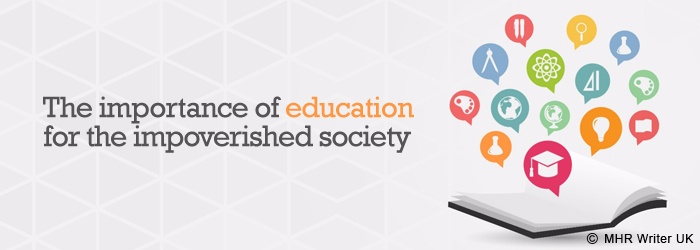The Importance of Education for the Impoverished Society
Posted on: September 21st, 2017
The importance of education is an international devotion to provide quality education to students all across the world regardless of gender, race, creed and or affluence. The key importance of education is that it reduces inequality among the sexes. This might not be such an obvious issue within the UK but all across the world there is a wide gender gap between men and women. The importance of higher education in society for women is almost zero in some cultures across the world. Women are completely deprived of the importance of higher education regardless of their achievements or capabilities. Sometimes the significance of education is undermined in third-world countries for the people living below the poverty line. Before we look at the benefits of education let us have a deeper look in to the challenges faced by education providers in the third world.
Educational Challenges for Low to Middle Income Nations
There are an estimated 274 million primary schoolchildren in lower and middle income countries which are not getting the basic primary education required to lead a healthy and productive lifestyle. The lack of data and analyses on teaching and learning impedes the understanding of factors driving low learning levels. This presents a significant challenge for the different establishments dedicated to administering quality educational services. As significant progress has been made in increasing access to education, particularly in the poorest, the average level of student learning remains low in many underdeveloped countries. Several millions of children attending school still do not acquire the basic skills and knowledge needed to lead productive lives. A child who could be a successful writer is not getting access to the basic primary education required to move on to the secondary level. Another challenge is that some countries have deep rooted culture which places more emphasis on remaining illiterate rather than acquiring education.

Scholastic Management Controversies and Solutions
Improving the quality of education is a complex concern. It raises issues regarding both the qualifications of the management within an institution and the parents and teachers of the concerned students. In third-world countries it is paradigm for academic institutions to be more concerned in making good business rather than providing quality education. This often poses the risk of students having to face a laid back attitude from teachers when students pose various questions about the HR dissertation topics or any other academic activity which has been assigned to them. That same management will be very pragmatic and outspoken when financial matters of the student will be concerned. Similarly some students will be from well off families and others will be not so powerful financially. The students from well off families will be the ones who can buy dissertations UK standards of education as well as fulfil the copy editing skills requirement posed to them by their institute.
Future Career Prospects for Underprivileged Students
In this plight of affairs it is the not so well off students who are the ones bound to suffer unless they possess some actual talent. They will be the ones to step in to practical life early without a full qualification trying to decide which careers match their skills. The rich will go from rich to even more wealthy and qualified and the poor will remain in the shackles of their hardships. This is the reason why the economic inequality or the income disparity continues to rise within the third world. The poor don’t stand a chance to compete because they lack the resources and means to measure up to the members of the more affluent society. There are organisations which are there to help the underprivileged students and families but their work is far and beyond that which is required in these countries.
Efforts of Educational Relief Providing Organisations
There are organisations like Save the Children and UNICEF which are contending for the deprived rights of education for young impoverished children. Once education has been instilled in a child or even an adult, the person begins to possess a completely new mind set. In these underdeveloped nations it is the reluctance to accept change which is causing friction for these organisations to advocate education for children. To put it simply, they don’t want to change. Education goes against their beliefs, cultures or traditions and these members of the underprivileged society lack the courage to go against the society as a whole. They risk being labelled negatively in the society and would rather continue to remain illiterate for the rest of their lives.
NOW
- Customer support 24/7
- 100% satisfaction guaranteed
- 100% confidentiality
- On-time help provided
- Contact directly to helper
- Unique ideas and thoughts

NOW
Let us Gladly
Assist you...!!
NOW
- IoT & Digital Signage Transformation
- Why Social Activities Are Beneficial In University
- How Videos Are Revolutionizing SEO Globally
- School-wide Strategies for Promoting Love of Reading
- Starter’s Guide To Analyze Variation Between Transactional And Promotional SMS
- Role Of IT In Education
- Steps To The Perfect College List
- Influencer Marketing: Up Your Game in Digital Marketing In 2020
- Self-Esteem Building Activities for University Students
- Image Optimization for the Web- Increasing Speed and UX
Disclaimer: We provide services for reference and assistance purpose. We are strictly bound to rule of not providing our work as finalised but you can take assistance from it.
Copyrights © 2025. All rights reserved by MHR Writer


